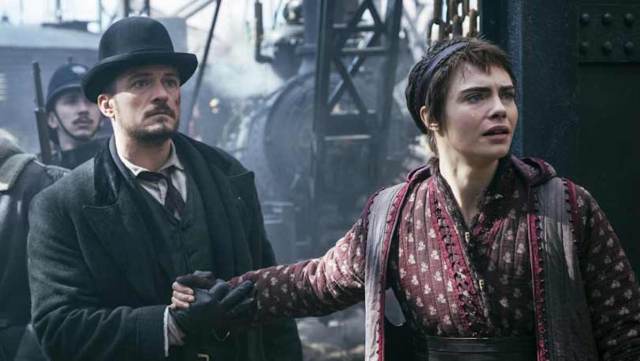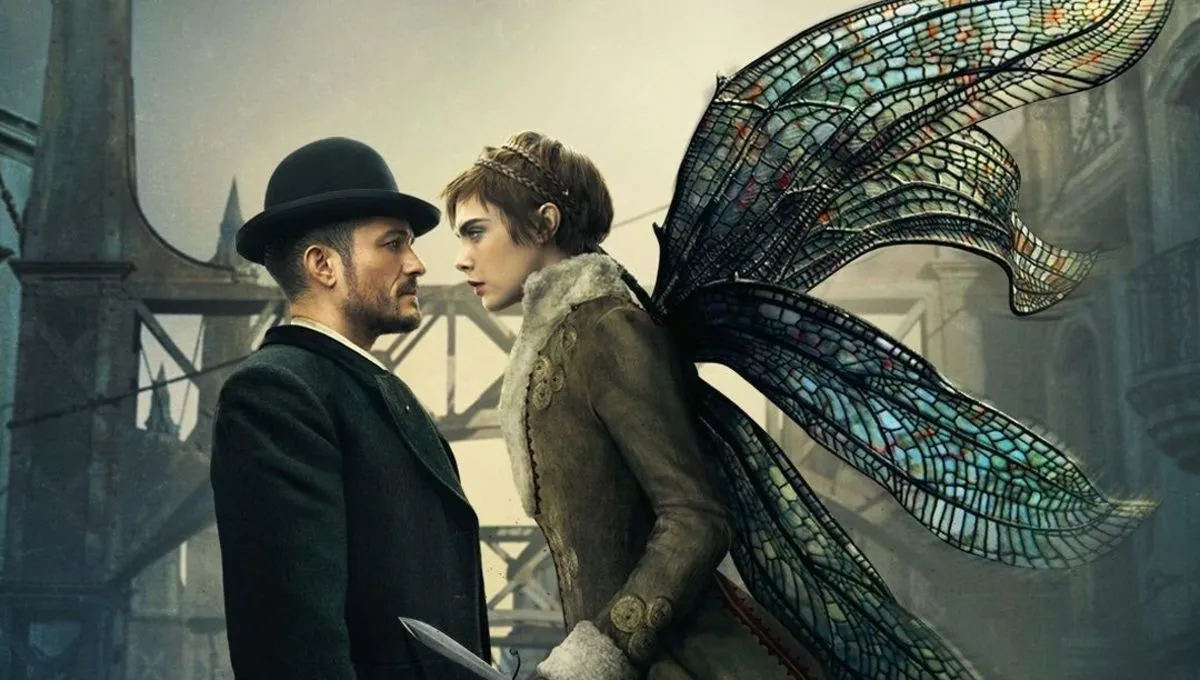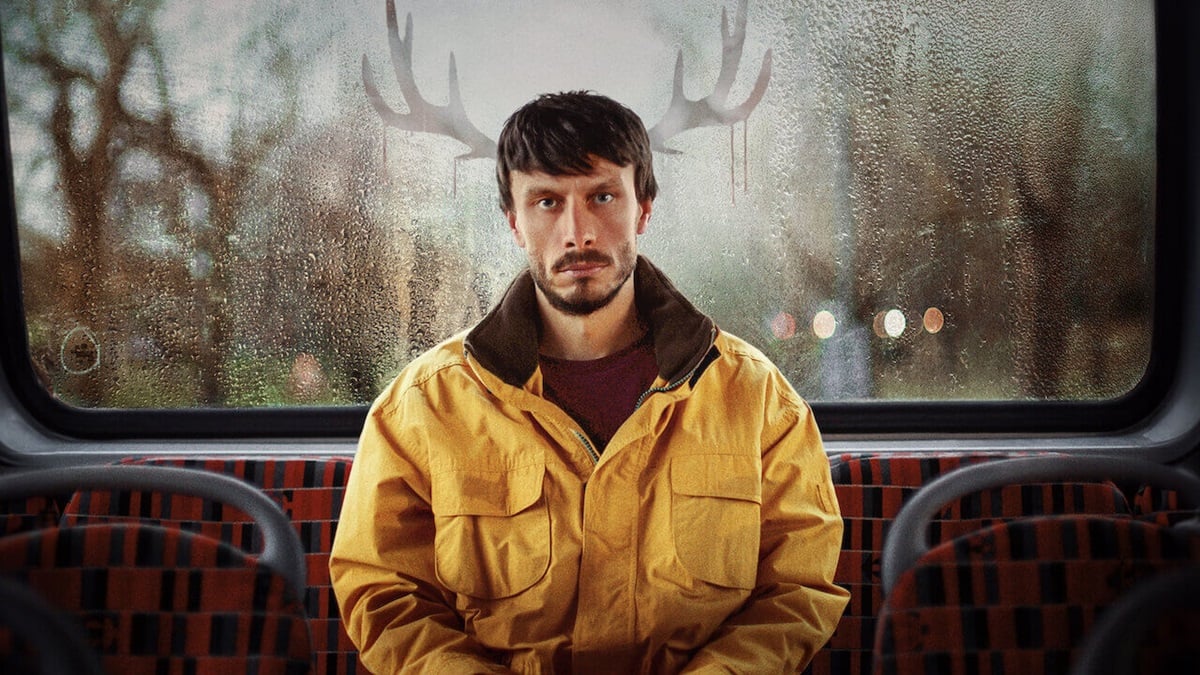I haven’t stopped thinking about Carnival Row since I binged the first season over the weekend. For good and ill, the show sticks with you, because it’s so damned close to the social chaos that’s gripping our world. It just happens to feature a whole lot of fairies.
***Minor spoilers for Carnival Row ahead***
Carnival Row arrives as an eight-episode season from Amazon Prime Video that’s technically centered around hard-bitten detective Rycroft Philostrate (Orlando Bloom) and his relations with gutsy fairy Vignette Stonemoss (Cara Delevingne) in a world teeming with fairies, pucks, kobolds, and other creatures who are unwelcome in the lands of men. Interspecies romance is anathema (though it happens often enough), and no one is as despised as the half-bloods who can sometimes “pass” and upend the rigidly maintained social order.
Before we begin, yes, those are the main characters’ real names, and yes, there are other steampunk-fantastical-Victoriana appellations turned up past eleven, like Runyan Millworthy, Imogen Spurnrose, Absalom and Piety Breakspear, Tourmaline Larou, and many more! Somewhere, Charles Dickens is smiling. Like everything it does, Carnival Row is not subtle in its naming, but it’s evocative. That’s my four-word review of the first season: not subtle, but evocative.
I’m going to dispense with what doesn’t work for me first, because there’s a whole lot that does, and so much love and effort has clearly gone into the crafting of this universe that picking it apart feels akin to kicking some rather adorable kobolds. Carnival Row infamously had a long and torturous development in Hollywood, originating in series writer and producer Travis Beacham’s buzzed-about spec screenplay, A Murder on Carnival Row. At one point, Guillermo del Toro was attached to direct the film, an alternate universe that is fascinating to contemplate. Amazon eventually ordered the script to series, and here we are. The result is that Beacham & Co. have had a long time to develop the history and setting, and that shows. So let’s get the middling stuff out of the way.
First, the central love story isn’t the guiding light the show wants it to be. Both Bloom and Delevingne are convincing in their roles, and both characters are likable hero-types, but they never quite coalesce in their forbidden passion for me. Philo and Vignette share a secret-laden, angsty backstory that’s fleshed out in episode 3, a flashback episode, and while the episode’s well done, it’s no kind of romantic turn that we haven’t seen before, if you’ve read Romeo & Juliet or Lord of the Rings. Affiliation to different worlds divides our lovers, who work better onscreen as supportive allies than anything else.

Still, it’s great fun to see Bloom, once genre film’s ingenue It Boy, dirty himself up and let himself be beat down as the sad-faced, rather sensitive-hearted Philo, and Delevingne shows that she’s far greater than the sum of her Suicide Squad parts as the stubborn, hard-charging Vignette. Delevingne has said that Vignette, like all fairies, is pansexual, something we see vaguely alluded to but never really fleshed out; sexuality is one area where the show falls down rather hard, but that’s for another article.
The central murder mystery that ostensibly drives the action on Carnival Row—which is the name for the Whitechapel-esque ghetto neighborhood of London-esque city The Burgue where non-humans cluster—is also a bit of a slog. A scary creature is eviscerating apparently random folks, throwing their guts around willy-nilly in another Jack the Ripper homage, and Philo’s on the case to find out why.
While the mystery becomes sharply more interesting as it becomes more personal to Philo, it’s also not too difficult to guess the reveal of the show’s main villain. Carnival Row relies too much on introducing plot twists that are either predictable from a mile away or so head-scratching that you never could have pieced them together in advance. Neither is the best sort of twist. Some side plots, like Vignette joining a bootlegging group of tough faeries called the Black Ravens, go nowhere and might have been dispensed with entirely.
The immense sprawl of the Burgue and its population makes this show worth watching, however. The disparate characters are Carnival Row‘s strength, anchored by excellent actors like Jared Harris, Indira Varma, Alice Krige, Tamzin Merchant, David Gyasi, and my personal favorite, Simon McBurney’s Runyan Millworthy, a down-on-his-luck producer of kobold Punch & Judy-type shows. Arty Froushan, as the louche heir-apparent to the Burgue’s political seat of power, has one of the series’ better character evolutions, as does Merchant as a stuck-up young woman who begins to overcome society’s baked-in racism against the fae rather in spite of her own intentions.
Carnival Row is bursting at the seams with intriguing characters and personalities, and it’s somewhat uneven in its distribution of how much time we spend with each. Some characters seem to idle for episodes before we get back to their action, but the fact that we care about what’s happening with them is encouraging. The show is overstuffed, yet I much prefer to have its surfeit of ideas rather than a flimsy backdrop where one-dimensional people roam. This universe is fully populated, with gorgeous costuming, creature design, and sets both lavish and grimy, and it’s easy to become fully immersed.
What will be spoken of about Carnival Row is its relentless focus on immigrants and racism. The fae have been living in the Burgue for years—some were born there—but they’re treated as second-class citizens, used as servants and sex workers, and casually debased in almost every interaction they have with “Anthropus Superior,” as the humans like to call themselves. Carnival Row takes pains to show that the real monsters are humans and their ignorant hatred, a societal divide exploited by unscrupulous politicians for their own gain. (Sound familiar?)
While some of these themes can emerge heavy-handedly, they also land heavily because they are so timely and wrenching. One of the most vital roles of science fiction and fantasy has always been to expose our own grave faults and fears through a fantastical lens. While segregation, racism, and cruelty towards the Other number amongst humanity’s oldest stories, Carnival Row is directly addressing our own era and our own politicians and our own hate-filled rhetoric that’s rampant worldwide—even if they’re wearing bowler hats and flying with faerie wings while they navigate injustice. As you watch migrants fleeing war-torn homelands, see them rounded up and deported, and how they suffer the disdain of the authorities, it’s easy to recognize ourselves under the faun horns.
I’ve read several reviews that suggest Carnival Row was made to fill the gritty genre vacuum created by Game of Thrones‘ conclusion, but Carnival Row is more tied to the realities of our world than Westeros ever wanted to be. I’d say it’s more like if Ripper Street had an influx of desperate immigrants out of Narnia. There are some political machinations and twists that could be called GoT-flavored, but only in that Game of Thrones borrowed from history and fantasy before it.
This is certainly not an escapist fantasy; nothing is a sharper reminder of the times that we live in. While it leans hard into magic and prophecy and other impossibilities that we lack, Carnival Row shines a frank light on classism and sexism alongside its central theme of racism. All of these isms, of course, rely on each other for promulgation—and the iron fist of a ruling class that will do anything to maintain their cultural superiority. A pitch-perfect choice that the show makes is to populate its quasi-Victorian setting with people of every color. Racism has never been shown as so patently absurd as when a diverse human population turns its nose up at the sight of someone who walks with hooves in place of feet.
Carnival Row has already been approved for a second season prior to its debut on August 30th, 2019. This is exciting news: the show really starts to pick up steam as it hurtles towards season’s end, and it sets up a number of fascinating and heartbreaking possibilities. Amazon Prime Video’s confidence in its success makes me hopeful that a second season can stand on even more solid ground, since so much worldbuilding and exposition will be out of the way. These characters should be unleashed and allowed to fly on their own merits.
(image: Amazon Prime Video)
Want more stories like this? Become a subscriber and support the site!
—The Mary Sue has a strict comment policy that forbids, but is not limited to, personal insults toward anyone, hate speech, and trolling.—










Published: Aug 15, 2019 02:51 pm